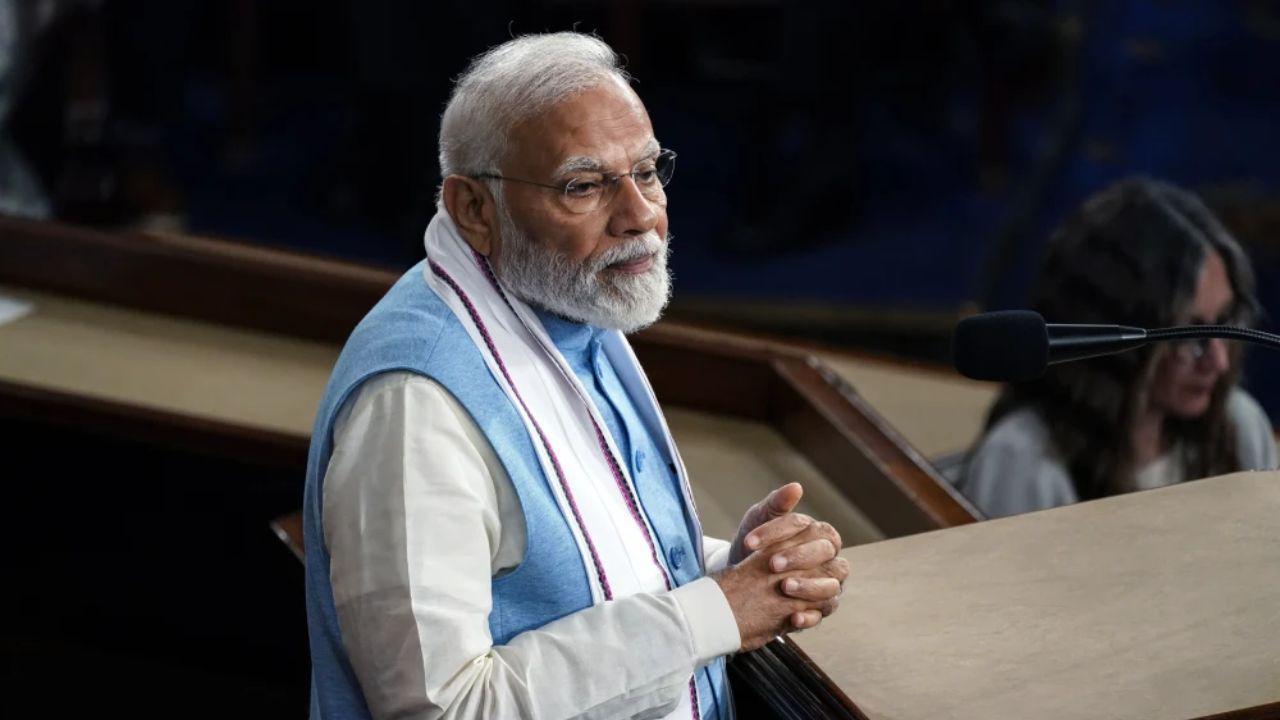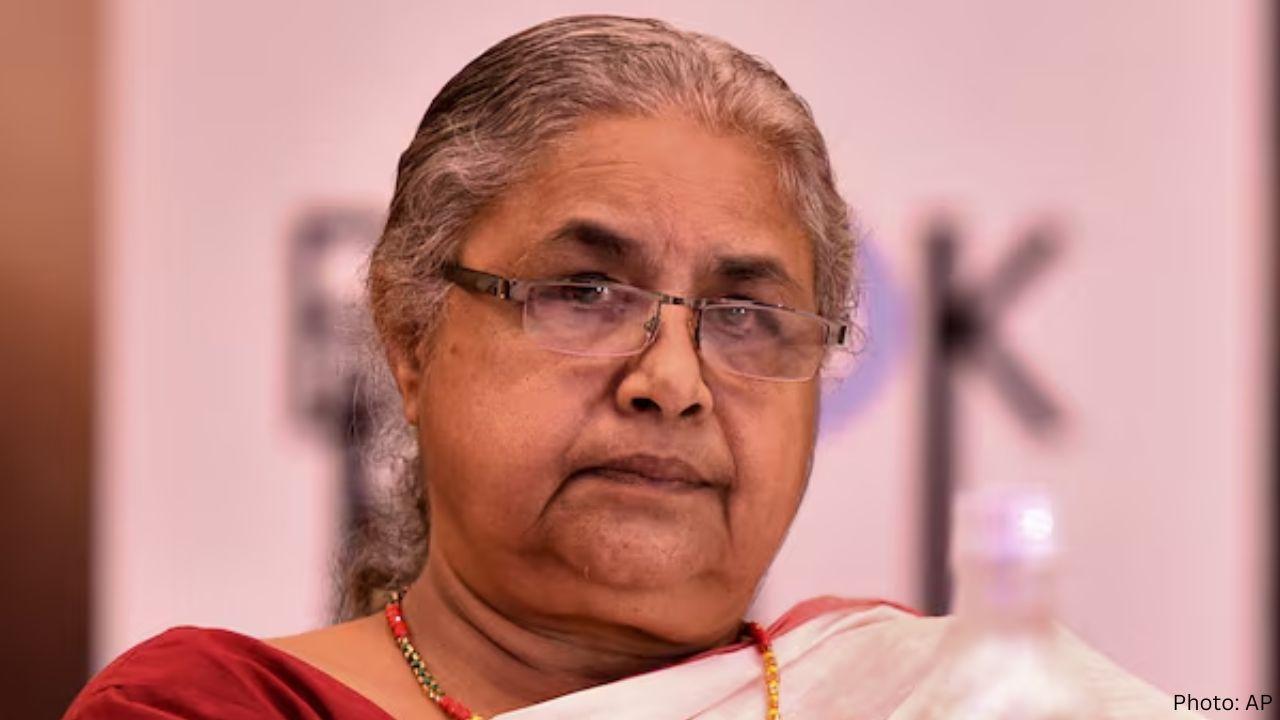
Join 10k+ people to get notified about new posts, news and tips.
Do not worry we don't spam!

Post by : Raman
Former US President Donald Trump stated on Monday that he was not informed in advance by Israeli Prime Minister Benjamin Netanyahu about Israel’s airstrike in Qatar last week. This revelation comes amid reports suggesting conflicting accounts of when the US was notified about the strike.
According to Axios, Netanyahu informed Donald Trump shortly ahead of the strike, but the Trump administration says it was only notified after missiles were already in the air. The discrepancy raises questions about communication between the United States and Israel, both key allies in the Middle East.
Israel carried out the strike on Tuesday, targeting Hamas leaders in Qatar. The attack marks a significant escalation in the ongoing Middle East conflict, which has already claimed tens of thousands of lives since Israel’s military operations in Gaza began in October 2023. The strike was widely condemned in the Middle East and by international observers, who warned it could further destabilize an already tense region.
Trump emphasized that he had no involvement in Israel’s decision to carry out the airstrike. “No, no, they didn’t,” he said when asked whether Netanyahu had spoken to him directly to alert him about the attack. His statement contradicts reports suggesting that the White House knew about the operation ahead of time. Even if the US was informed shortly before the strike, it is unclear whether there would have been enough time to intervene or prevent it.
Netanyahu’s office responded to the Axios report, describing the airstrike as a “wholly independent” Israeli operation. Israel has maintained that its military actions are aimed at protecting national security and responding to threats from Hamas, the Palestinian militant group controlling Gaza.
The airstrike in Qatar is a sensitive issue because Washington maintains relationships with both Israel and Qatar. Qatar has played a significant role as a mediator in attempts to negotiate a ceasefire in Gaza. The US has traditionally relied on Doha to help facilitate communication and agreements between conflicting parties in the region.
Since October 2023, Israel’s military operations in Gaza have resulted in a humanitarian crisis. Tens of thousands of people have died, and the entire population of Gaza has been displaced. The situation has led to widespread hunger, shortages of medical supplies, and severe disruption of daily life. Multiple human rights experts and scholars have described the attacks and resulting conditions as genocide. Israel denies these claims, asserting that its actions are a form of self-defense in response to attacks by Hamas, which killed over 1,200 people and took more than 250 hostages.
Beyond Gaza, Israel has extended its military operations to other countries in the region, including Lebanon, Syria, Iran, and Yemen. These actions have further increased tensions and concern among international observers. The airstrike in Qatar represents a new development, expanding the conflict geographically and politically.
The US has traditionally been a close ally of Israel, providing military and diplomatic support. However, the Qatar strike highlights the delicate balance the US must maintain in the Middle East. On one hand, the US supports Israel’s right to defend itself. On the other hand, Washington seeks stability and peace in the region, particularly through mediators like Qatar. Any unilateral Israeli military action without prior coordination can complicate US diplomacy and regional stability.
Trump’s remarks also underline a broader issue of transparency and communication between Israel and the United States. During his presidency, Trump had a strong relationship with Netanyahu. This recent strike raises questions about whether Israel coordinated sufficiently with Washington or acted independently despite the US’s role as a key ally.
The strike in Qatar specifically targeted Hamas leaders, a group that has carried out multiple attacks against Israel, including the October 2023 assault that triggered Israel’s Gaza offensive. The attack involved precision airstrikes and reportedly aimed to disrupt Hamas’s command and operations. While Israel considers Hamas a terrorist organization, critics argue that such actions risk further escalation and civilian harm.
The international reaction to the Qatar strike has been largely critical. Many governments and organizations warned that this attack could worsen tensions and lead to broader conflict in the Middle East. Analysts fear that targeting Hamas leaders outside Gaza may provoke retaliatory actions, increase anti-Israel sentiment, and strain diplomatic relations in the region.
Trump’s statement that he was not informed in advance is significant for US foreign policy. It suggests that even powerful allies like Israel may take unilateral military action without consulting Washington fully. This can have implications for international diplomacy, intelligence sharing, and crisis management in the Middle East.
The humanitarian situation in Gaza remains a pressing concern. Israel’s operations since October 2023 have created widespread devastation. Tens of thousands of people have been killed, and the infrastructure in Gaza has been severely damaged. Hospitals and schools have been destroyed, leading to significant suffering among civilians. Shortages of food, water, and medical supplies have created a dire situation. International aid agencies have struggled to deliver help due to ongoing military operations and blockades.
Experts continue to debate whether Israel’s actions in Gaza constitute genocide or self-defense. Some scholars argue that the scale and targeting of civilian populations, combined with the blockade and displacement, fit the definition of genocide under international law. Israel rejects these claims, maintaining that it is defending its citizens against attacks by Hamas. This debate remains a contentious issue in global politics and human rights discussions.
Qatar’s role as a mediator adds complexity to the situation. Doha has been actively involved in negotiating ceasefires and providing humanitarian aid to Gaza. The airstrike targeting Hamas leaders in Qatar could complicate these efforts and make it harder to achieve peace. Analysts warn that such actions risk undermining diplomatic channels and increasing tensions between regional powers.
The strike also highlights the regional dynamics of Middle East conflict. Israel has conducted military operations not only in Gaza but also in neighboring countries, including Lebanon, Syria, Iran, and Yemen. These operations reflect the broader security concerns Israel faces but also create a volatile regional environment. Each strike has the potential to spark retaliation, increase tensions, and involve multiple countries in the conflict.
Trump’s comments about not being informed beforehand indicate a potential gap in communication between allies. The US has historically relied on Israel for intelligence and coordination in security matters. If significant military actions occur without prior notice, it may affect trust, coordination, and the ability to respond diplomatically.
The strike in Qatar also raises questions about targeted military operations outside a country’s borders. While Israel claims the strike targeted Hamas leaders, critics argue that such actions can violate international law and create broader geopolitical risks. The international community continues to debate the legality, ethics, and consequences of cross-border strikes in conflict zones.
In conclusion, the Qatar airstrike represents a significant escalation in the ongoing Middle East conflict. Trump’s statement that he was not informed in advance highlights issues of coordination between the US and Israel. Israel asserts that the strike was an independent operation targeting Hamas leadership, while the US and Qatar have important diplomatic roles in maintaining regional stability.
The humanitarian crisis in Gaza continues to worsen, with tens of thousands of casualties, widespread displacement, and severe shortages of basic necessities. The international community remains deeply concerned about the impact on civilians and the potential for further escalation.
As tensions persist, the Qatar airstrike underscores the complex dynamics of Middle East politics. The balance between military action, diplomacy, and humanitarian concerns remains fragile. The world watches closely, hoping that diplomatic efforts, mediated by countries like Qatar, can reduce violence and prevent further suffering among civilians.
The events also illustrate the challenges of international alliances, where even close allies may act independently in pursuit of national security objectives. Effective communication, diplomacy, and humanitarian considerations are critical to managing conflicts and preventing broader regional escalation.
Ultimately, the Qatar strike serves as a reminder of the fragile balance in the Middle East. Military operations, even when targeted at specific groups, have far-reaching consequences. Coordination between allies, protection of civilians, and commitment to diplomatic solutions remain essential to achieving long-term peace and stability in the region.
Donald Trump, Benjamin Netanyahu, Israel Qatar strike, Hamas, Middle East conflict, Gaza war










Lily Collins Shines in Glamorous Calvin Klein Look at New York Fashion Week
Lily Collins stuns at NY Fashion Week in a sparkling Calvin Klein co-ord set, blending elegance, gla

Lippo Di Carrara wins UAE President’s Cup Derby at Doncaster
Lippo De Carrere shines at Doncaster, winning the UAE President’s Cup UK Arabian Derby, the richest

Jaismine Lamboria Wins World Boxing Gold for India
India’s Jaismine Lamboria claimed World Boxing gold, while Nupur Sheoran earned silver and Pooja Ran

Sri Lanka beat Bangladesh by 6 wickets in Asia Cup 2025 opener
Sri Lanka started their Asia Cup 2025 campaign with a six-wicket win over Bangladesh, powered by Nis

PM Modi Lays ₹6,300 Crore Projects in Assam Criticizes Congress
PM Modi accuses Congress of backing infiltrators, lays ₹6,300 crore health and infrastructure projec

Sushila Karki Becomes Nepal’s First Woman Prime Minister
Eminent jurist Sushila Karki, 73, becomes Nepal’s first woman prime minister after Gen Z protests to